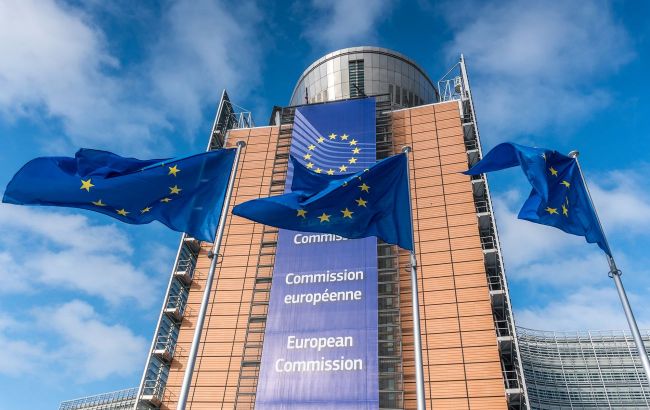EU approves new sanctions hitting Russia's energy, banking, and tech sectors
 EU approves new sanctions hitting Russia's energy, banking, and tech sectors (photo: Getty Images)
EU approves new sanctions hitting Russia's energy, banking, and tech sectors (photo: Getty Images)
The European Union has officially approved a new sanctions package against Russia. The restrictions are aimed at reducing the Kremlin's revenues and preventing the circumvention of sanctions through third countries, according to a publication in the EU's Official Journal.
The EU Council's decision adds 45 companies to the list of entities supporting Russia's military and industrial complex.
Among them are enterprises from third countries that help Moscow circumvent export restrictions and obtain dual-use technologies, including machinery, electronics, and drone components.
The list includes 12 companies from China and Hong Kong.
Ban on liquefied gas imports and new trade restrictions
Starting from April 25, 2026, and for long-term contracts from January 1, 2027, the EU introduces a complete ban on the purchase, import, and transfer of liquefied natural gas from Russia. The provision of any technical or financial services related to these supplies is also prohibited.
The EU has also imposed a full ban on transactions with two major Russian oil companies, Rosneft and Gazpromneft, and introduced sanctions against 118 additional vessels of the so-called shadow fleet that allowed Russia to circumvent previous measures.
The new sanctions also apply to the export of goods that could strengthen Russian industry, including metals, ceramics, rubber products, and construction materials. The EU has also added further restrictions on the export of equipment used in military systems.
Blow to financial and cryptocurrency infrastructure
The sanctions expand the ban on financial operations with Russian banks and organizations connected to the payment systems of the Central Bank of Russia, including Mir and SBP. The restrictions also apply to companies providing crypto services and electronic payments to Russian citizens and companies.
The EU has added eight new financial institutions to the sanctions lists and prohibited the provision of services related to crypto assets. This was done to stop the use of cryptocurrency networks to bypass sanctions.
New restrictions on tourism and technology services
The document also prohibits providing Russia with a range of commercial and tourism services, including tour operator activities, geological exploration, and technical consulting. These measures are aimed at reducing revenues from non-essential sectors and limiting Moscow's technological capabilities.
The EU also restricts cooperation with enterprises operating in Russia's special economic zones and innovation clusters, including the Arctic and Far Eastern zones. Participation in new projects, the creation of joint ventures, and the financing of such companies are prohibited.
Control over diplomats and measures to protect businesses
The EU Council introduces a notification mechanism for Russian diplomats and consular staff when traveling within the Schengen area. This is related to Russia's growing intelligence activity in Europe.
In addition, the European Union has extended the deadlines for European companies to exit the Russian market, emphasizing that the rule of law no longer applies in Russia and that foreign assets are at risk of expropriation.
New bans on connections to Russian financial systems
Starting from June 25, 2024, legal entities, organizations, or structures registered in the EU but operating outside Russia are prohibited from connecting to the System for Transfer of Financial Messages (SPFS) of the Central Bank of Russia or similar Russian specialized systems.
From January 25, 2026, this ban will be expanded — it will prohibit connections to any systems of the Central Bank of Russia and other Russian systems with financial functionality, including the Faster Payments System (SBP) and Mir.
The ban also applies to transactions with foreign legal entities that use SPFS or similar Russian systems. Exceptions are allowed for contracts concluded before October 24, 2025, with execution until April 25, 2026.
Tightening control over financial and payment institutions
It is prohibited to enter into agreements, directly or indirectly, with organizations outside the EU that provide crypto or payment services if they serve entities under sanctions or support Russia's military actions.
The restrictions also apply to mirror or successor structures of these organizations — if they retain the same brand identity, infrastructure, users, and management.
Exceptions are made for contracts concluded before October 24, 2025, as in other sections, and for receiving payments under obligations from already existing agreements.
New restrictions on participation and activities in Russia's special zones
It is prohibited to acquire or expand participation in Russian legal entities registered in special economic, innovation, or preferential zones.
It is also forbidden to create joint ventures, branches, or representative offices in these zones, or to conclude contracts for the supply of goods, services, or intellectual property to them.
From January 25, 2026, it will be prohibited to maintain existing shares, contracts, or participation in such zones.
The restrictions also apply to financing, investment services, and transfers related to entities in these zones.
Service sector, software, and consulting
It is prohibited to provide legal, auditing, consulting, IT, artificial intelligence, quantum computing, and other services to the Russian government or organizations registered in Russia.
A special permit may be requested in specific cases if the services do not fall under direct bans.
Exceptions are possible for the protection of the right to legal defense, recognition or enforcement of court decisions, or in exceptional humanitarian or technological situations.
A ban on operations involving crypto assets is also introduced.
Visa and transit notifications for diplomats
Russian diplomats, consuls, and their families who hold residence permits or visas must notify their travel intentions at least 24 hours in advance if they plan to enter or transit through the territory of EU member states.
This rule does not apply to minors or family members who are not part of the diplomatic household. The requirement takes effect on January 25, 2026.
EU member states may also introduce national measures requiring authorization for the transit of Russian diplomats, provided international obligations are respected.
On October 23, the European Union approved the 19th package of sanctions against Russia.
The sanctions package was adopted after several weeks of negotiations among member states that were unable to agree on the details. Austria, Hungary, and Slovakia had blocked the decision by putting forward their own demands.

